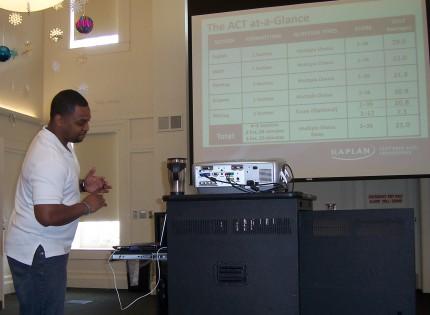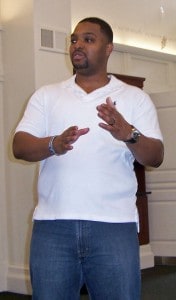

By Lisa Carolin
Kaplan Test Prep recommends that students start preparing for the ACT in the summer before their sophomore year. The company believes that every competitive university wants to see an ACT score.
Charles Polk, a teacher at Kaplan, spoke at the Chelsea District Library Feb. 16 about how to prepare for the ACT. He said that the ACT covers English grammar, reading comprehension, math, and writing.
“The maximum ACT score is 36,” said Polk. “The University of Michigan wants at least a 30, and Michigan State University wants at least a 27.”
The ACT exam that will be offered in March is free and aimed at high school juniors. Chelsea High School junior Maria Osentowski attended the Kaplan Test Prep because she said, “I want to get a good score and get into a good college.”
Every sophomore at Chelsea High School takes a practice ACT. Polk says that guidance counselors at the school can give students a code that allows them to access a free Kaplan site that helps students learn how to increase their ACT score.
Polk, who says that the ACT is 75 percent a reading test, offered some hints to improve English ACT scores including:
- Avoiding wordy and redundant answers on the English section of the test.
- Choosing the answer that sounds best by plugging in all the answer choices.
- Participating in the library’s summer reading program to increase the reading comprehension score.
As far as the reading comprehension section of the ACT, Polk said, “There are four passages with 10 questions each and you have 35 minutes. Take your time on the first three if you’re a slow reader. You have to actually read all of the passages. Write down a summary of each paragraph as soon as you read them.”
Polk said that there are two trap answers per question to prevent students from skimming. He also said that it’s always worth guessing if you don’t know the answer because no one is penalized for wrong answers.
As far as improving math scores, Polk suggested:
- Geometry is half the math test so brush up on the rules of circles and triangles, the Pythagorean theorem, and basic algebra.
- There are no more than four trigonometry questions on the ACT.
“The writing section of the ACT is easy and can help increase your score so take it,” advised Polk.
Finally he said, “Don’t over think things. Trust in your first thought.”














